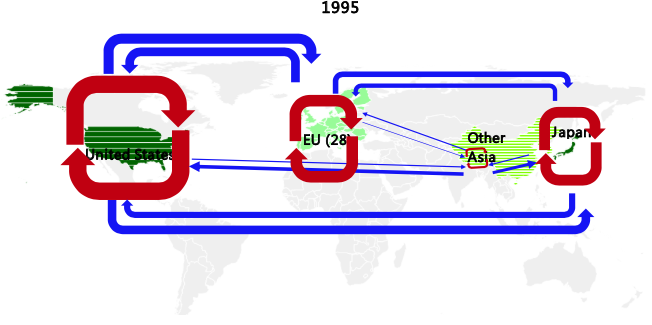Relying on a global dataset from the European Patent Office (PATSTAT), researchers were recently able “to trace knowledge flows using cross-patent citations, that is, the extent to which countries cite patents from other innovators as prior knowledge in their own patent applications. A first look at the data (Figure 3) suggests knowledge flows have increased significantly over the last two decades, and China and South Korea (depicted in Figure 3 as ‘other Asia’) have become substantially more integrated in global citations, both as citing and as cited innovators.”


They also find that “the share of technology leaders’ knowledge that diffuses to emerging market economies has increased steadily and significantly over time – and this finding is robust to excluding China from the ‘recipient’ economies (Figure 4). In contrast, the diffusion of knowledge from the G5 to (non-G5) advanced economies has remained flat or even moderated somewhat – albeit from a higher level – since the global financial crisis.”

It turns out
that both emerging market and other advanced economies have been able to capitalise on knowledge flows from the G5 to increase domestic innovation (measured by patenting) – with foreign knowledge playing a relatively larger role than domestic R&D in emerging market economies. These results also apply to productivity, suggesting that knowledge from the G5 has contributed to boosting income levels in other countries. The impact on productivity is economically meaningful, especially for emerging market economies. For instance, between 2004 and 2014, knowledge flows from the technology leaders may have generated, for an average country-sector, about 0.7 percentage point of labour productivity growth per year (Figure 5). This amounts to about 40% of the observed average sectoral productivity growth in this period.

Finally, the researchers’ “results point to a positive empirical relation internationally” between competition and innovation. They conclude,
Globalisation has intensified the international diffusion of technology, which is crucial to share growth potential across countries and boost global growth. The positive impact has been particularly large for emerging market economies, helping increase productivity for them, and supporting income convergence. Our results also suggest that the growing competition from emerging market economies may lead to more innovation, even in advanced economies.